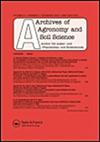Exogenous IAA enhances low potassium tolerance of sweetpotato by regulating root response strategy
IF 1.8
4区 农林科学
Q1 AGRONOMY
引用次数: 0
Abstract
Plant roots are sensitive to potassium (K+) deficiency signals. Therefore, regulating root growth by exogenous methods is a vital strategy to improve low K+ tolerance of sweetpotato. We studied the effects of exogenous indole-3-acetic acid (IAA) on growth, K+ absorption, and root characteristics in sweetpotato exposed to low K+ treatment (LK). LK significantly inhibited dry mass, K+ concentration and accumulation, as well as the root elongation (length) and branching (forks and crossings) in sweetpotato seedlings. However, exogenous IAA increased the length, ratio, and density of lateral roots and promoted absorption and accumulation of K+, which effectively alleviated the inhibitory effect of low K+. Exogenous IAA also increased the expression levels of auxin synthesis (IbYUC6 and IbTAR2) and transport (IbPIN1, IbPIN3, and IbPIN8) genes in leaves and roots, which promoted the increase of endogenous IAA content. Furthermore, exogenous IAA was more effective on low-K-tolerant variety (XS32) than low-K-sensitive variety (NZ1) under LK stress, depending on their different IAA synthesis and transport strategies. These results indicated that exogenous IAA enhanced root responsiveness of sweetpotato to low K+ stress by modulating auxin biosynthesis and transport, thereby improving the tolerance of sweetpotato to low K+ stress.外源IAA通过调控根系响应策略提高甘薯的低钾耐受性
植物根系对钾(K+)缺乏信号敏感。因此,通过外源途径调控甘薯根系生长是提高甘薯耐低钾性的重要策略。研究了外源吲哚-3-乙酸(IAA)对低钾处理(LK)甘薯生长、钾离子吸收和根系特性的影响。LK显著抑制了甘薯幼苗的干质量、钾离子浓度和积累,以及根系伸长(长度)和分枝(分叉和交叉)。而外源IAA增加了侧根的长度、比例和密度,促进了K+的吸收和积累,有效缓解了低K+的抑制作用。外源IAA还增加了叶片和根系中生长素合成(IbYUC6和IbTAR2)和运输(IbPIN1、IbPIN3和IbPIN8)基因的表达水平,促进了内源IAA含量的增加。此外,在LK胁迫下,外源IAA对低钾耐药品种(XS32)比低钾敏感品种(NZ1)更有效,这取决于它们不同的IAA合成和运输策略。上述结果表明,外源IAA通过调控生长素的合成和运输,增强了甘薯根系对低K+胁迫的响应性,从而提高了甘薯对低K+胁迫的耐受性。
本文章由计算机程序翻译,如有差异,请以英文原文为准。
求助全文
约1分钟内获得全文
求助全文
来源期刊

Archives of Agronomy and Soil Science
AGRONOMY-SOIL SCIENCE
CiteScore
5.50
自引率
4.20%
发文量
107
期刊介绍:
rchives of Agronomy and Soil Science is a well-established journal that has been in publication for over fifty years. The Journal publishes papers over the entire range of agronomy and soil science. Manuscripts involved in developing and testing hypotheses to understand casual relationships in the following areas:
plant nutrition
fertilizers
manure
soil tillage
soil biotechnology and ecophysiology
amelioration
irrigation and drainage
plant production on arable and grass land
agroclimatology
landscape formation and environmental management in rural regions
management of natural and created wetland ecosystems
bio-geochemical processes
soil-plant-microbe interactions and rhizosphere processes
soil morphology, classification, monitoring, heterogeneity and scales
reuse of waste waters and biosolids of agri-industrial origin in soil are especially encouraged.
As well as original contributions, the Journal also publishes current reviews.
 求助内容:
求助内容: 应助结果提醒方式:
应助结果提醒方式:


